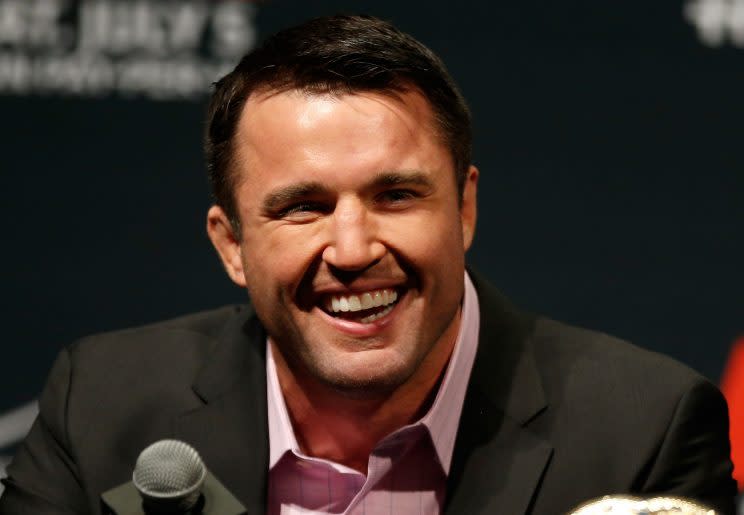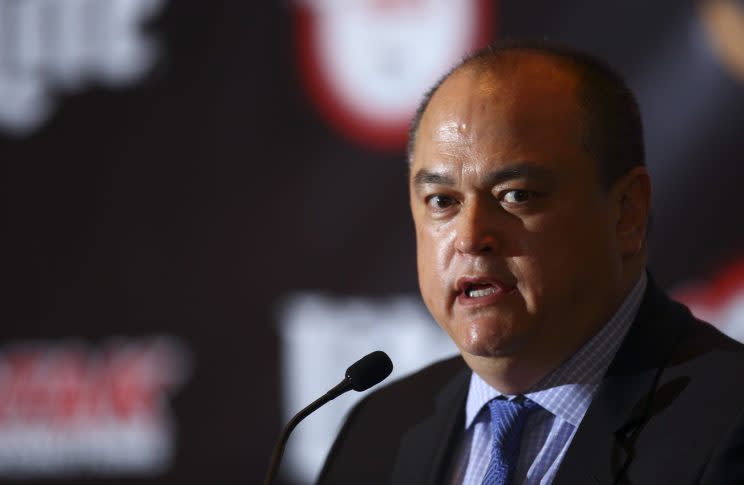Chael Sonnen's signing shows Bellator isn't taking drug testing seriously

Bellator MMA is the world’s second-best mixed martial arts promotion and it’s closing the gap on No. 1. It puts on an outstanding show, and regularly makes terrific fights.
Its president, Scott Coker, is a shrewd judge of talent, and with Viacom’s money, Coker has the financial wherewithal to compete for the best fighters on the market.
He signed another prominent free agent on Thursday, and though this one will generate plenty of excitement and news coverage for his company, it’s an out-and-out disaster.
Bellator signed Chael Sonnen, the former UFC middleweight, and one of the worst drug cheats in the history of professional sports, to a multi-fight, multi-year deal, it announced.
Sonnen served the penalty handed to him and deserves the right to make a living, if fighting is what he chooses to do. But Sonnen, who has shown he’ll cheat without compunction at the slightest opportunity, has joined a promotion that essentially acts as if there is no performance enhancing drug issue in mixed martial arts.
Listen to Coker talk about drug testing and Bellator’s lack of it, and you’d swear you’re listening to one of UFC president Dana White’s inane defenses of a cheating fighter circa 2014. For years when a UFC fighter failed a test and White was pushed about making penalties harsher, he’d smile and say, ‘We’re being tested by the government,” with the insinuation being that testing by state athletic commissions was rigorous and something to be feared by PED-filled athletes.
It wasn’t anything of the sort, of course, and we’re only left to guess how many fighters successfully fought with steroids and other PEDs in their bodies under that system.
It began to change in July 2015, when the UFC partnered with the United States Anti-Doping Agency and implemented a plan that is among the toughest, if not the toughest, in sports.
But Bellator has no drug testing program and no known plans to add one. And so, perhaps, it’s not surprising that Sonnen chose to sign with Bellator upon his return. He’ll fight at light heavyweight, according to a news release from Bellator, instead of middleweight, where he made his name in the UFC.
It’s probably more due to his age — he’s 39 and hasn’t fought since losing to Rashad Evans at UFC 167 on Nov. 16, 2013 — and his lack of recent competition more than anything else, but his history with drugs at least makes one wonder about the move.
Oh, have no doubt, if he believes he’ll be able to get away with it, it wouldn’t shock anyone if he resumes PED usage in Bellator. Given Coker’s views on the topic, he seemingly doesn’t have to worry too much about a collector from USADA showing up on his doorstep at 6 a.m. to collect a random sample.
In 2014 after he was suspended by the Nevada Athletic Commission and fired by Fox from his job as an analyst (which he was very good at), he went on Chris Jericho’s podcast and admitted he knew full well what he was doing.
“I’m a grown man,” he said. “I knew what I was doing. I thought I could have my cake and eat it, too. I can take this, I can feel great, they make me feel good, and that’s one of the problems I have. They go ‘These are performance enhancers.’ I go, ‘Guys, why else am I taking it?’ ”
Bellator relies on state athletic commission testing instead of testing it pays for itself from an independent agency such as USADA. It’s an expensive proposition and costs the UFC multiple millions of dollars per year, but it’s clearly worth it.
And while it is a lot of money, Viacom is a wealthy company with revenues in the $15 billion range annually. A couple of million a year for drug testing for Bellator is peanuts in the big picture.
Throughout his career, Coker essentially ignored drug testing. It’s been his one failing in a fabulous career in which he’s built many of the biggest stars in the sport. He understands how to put fighters together to get a good fight, and he’s got a big brother-type relationship with the fighters.

Most of the fighters who work for him rave about him. It’s hard to recall any fighter expressing serious displeasure with him.
And while there are some fighters who want drug testing, the vast majority do not. It’s a hassle for them, firstly, and the sad truth is that many of them would rather have the ability to use PEDs to work through a training camp injury or to give themselves an extra bit of insurance, so to speak.
Coker, though, needs to take a stand on this issue and the Sonnen signing provides him the perfect opportunity. He shouldn’t rely on state athletic commission testing, which lacks money.
There are undoubtedly going to be some who blast Bellator and Coker for signing Sonnen in the first place. That, though, doesn’t make sense. He has served his penalty, he’s qualified to fight and he sells tickets. Fans love watching him.
He also cheats, and he needs to be watched closely. There are a handful of states which test reasonably well — California, Nevada and New Jersey come to mind — but there are far too few in which the testing remains laughably inept.
It’s on Coker to decide it’s time to take the PED problem seriously.
Sadly, his history suggests he’ll defer to the state and go on his merry way, letting the cheaters cheat and putting the clean fighters at risk.
It doesn’t have to be that way, of course. It’s his choice.


